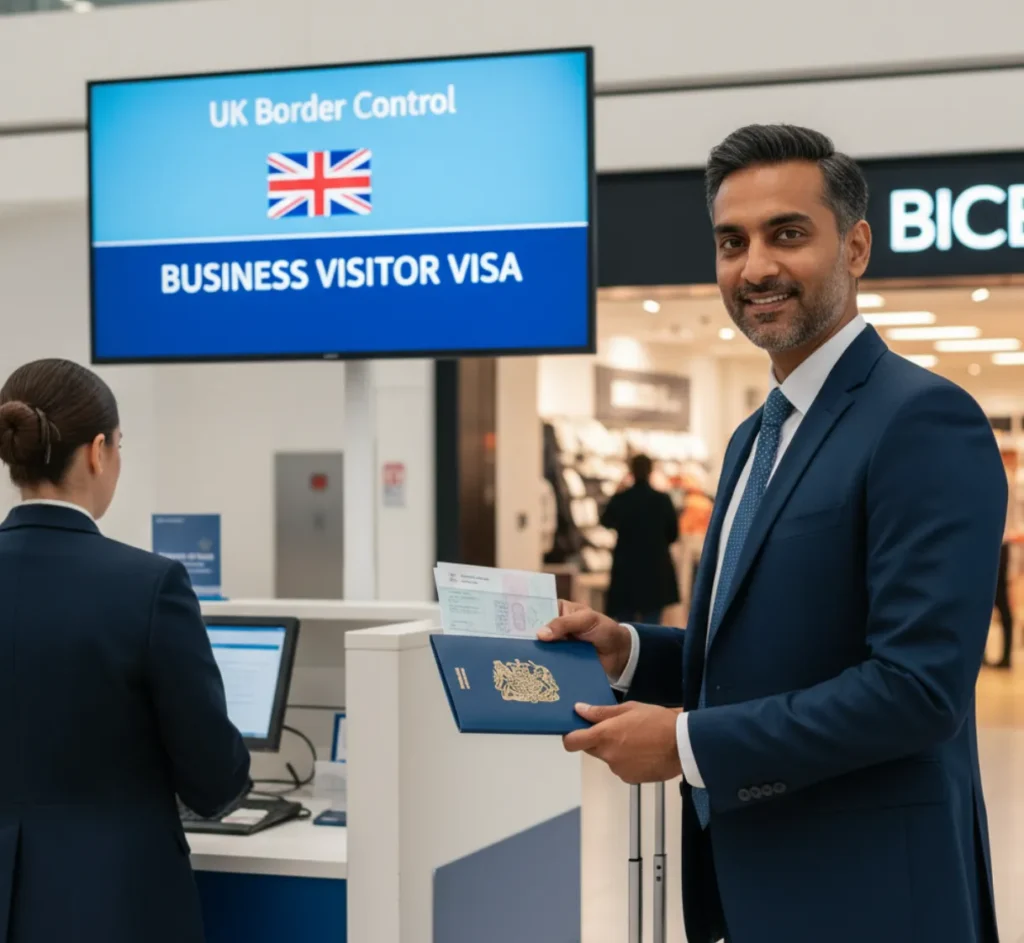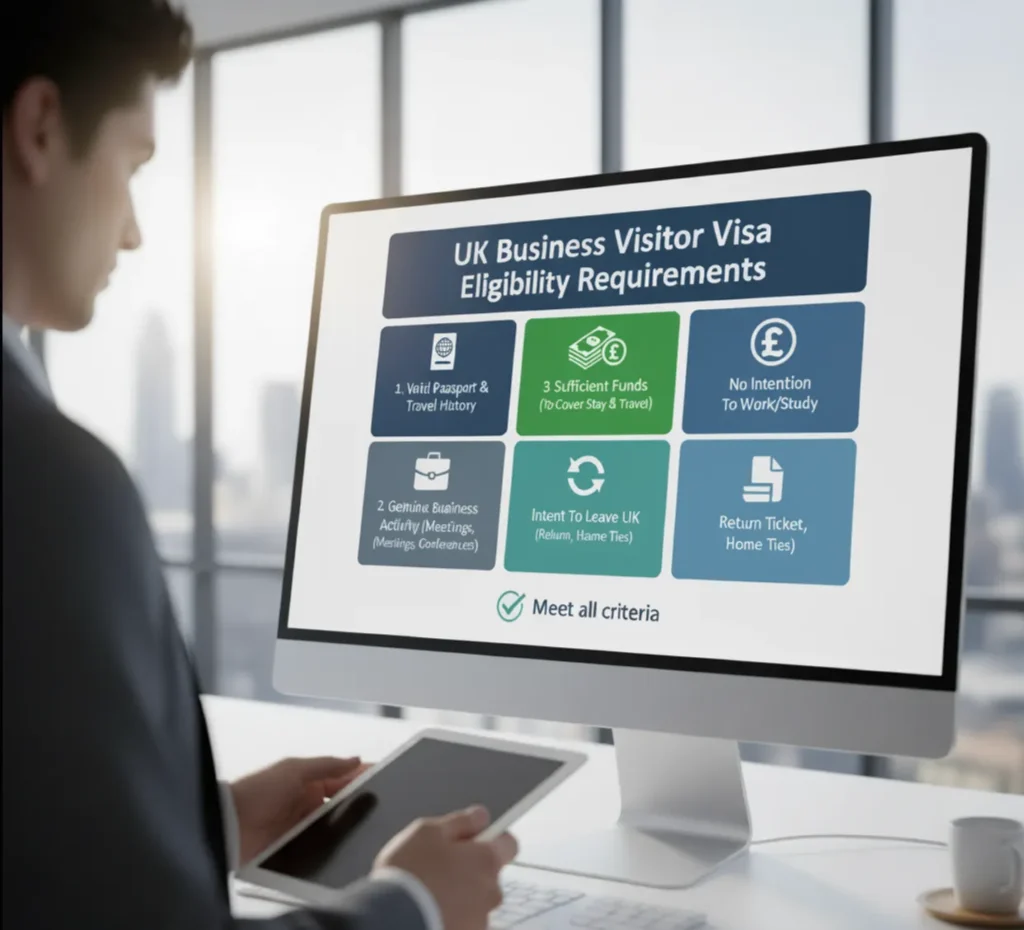UK Business Visitor Visa 2025: Complete Guide for International Travellers
The UK business visitor visa landscape has evolved significantly in 2025, with new Electronic Travel Authorisation requirements and updated immigration rules affecting how international travellers can enter Britain for business purposes. Whether you’re attending meetings in Manchester, signing contracts in Edinburgh, or conducting site visits across England, understanding the current visa requirements could save you from costly refusals and embarrassing border issues.
This comprehensive guide breaks down everything you need to know about UK business visitor visas in 2025, from eligibility requirements to application processes, helping you make informed decisions about your travel documentation.
Table of Contents
What is a UK Business Visitor Visa in 2025?
A UK business visitor visa allows foreign nationals to enter Britain temporarily for specific unpaid business activities. Operating under the Standard Visitor visa framework in the Immigration Rules, this route permits short-term stays of up to six months for legitimate business purposes without engaging in the UK labour market.
The visa covers activities that support your overseas employment or business interests, such as attending conferences, negotiating contracts, conducting site inspections, and participating in training sessions. However, strict limitations apply to what you can and cannot do during your stay.

Legal Definition Under Immigration Rules
The business visitor route sits within Appendix V of the UK Immigration Rules, with permitted activities detailed in Appendix Visitor: Permitted Activities. These rules apply whether you’re applying for a visa in advance or seeking entry clearance at the border as a non-visa national.
The Home Office maintains strict oversight of visitor activities, and UKVI officials regularly assess whether travellers genuinely qualify as temporary visitors rather than people seeking to work or live in the UK.
Who Needs This Visa Type
Your nationality determines whether you need a business visitor visa or can travel under alternative arrangements. Visa nationals from countries including Afghanistan, China, India, and Nigeria must obtain a visa before travelling. Non-visa nationals from countries like the United States, Canada, and Australia may now require an Electronic Travel Authorisation instead.
The distinction matters because different application processes and timescales apply, but the same activity restrictions govern all business visitors regardless of their entry route.
Do You Need a Business Visitor Visa or ETA in 2025?
The Electronic Travel Authorisation system has fundamentally changed UK entry requirements for business travellers in 2025. Understanding which permission you need prevents last-minute travel disruptions and ensures compliance with current immigration rules.
Visa Nationals vs Non-Visa Nationals
Visa nationals must always apply for a Standard Visitor visa before travelling, regardless of their trip’s duration or purpose. This advance application requirement cannot be waived, and attempting to travel without a visa will result in being refused boarding by airlines.
Non-visa nationals traditionally could arrive at UK borders without advance permission, but the ETA system now requires most to obtain digital travel authorisation before departure. Only a small number of nationalities retain visa-free travel rights, and this is expected to change by late 2025.
Electronic Travel Authorisation (ETA) Requirements
The ETA system launched in 2024 and expanded throughout 2025, covering nationals from Qatar, Bahrain, Jordan, Kuwait, Oman, Saudi Arabia, United Arab Emirates, the United States, Canada, Australia, and New Zealand. Additional nationalities will be added as the system reaches full implementation.
An ETA costs less than a traditional visa and typically processes within days rather than weeks. However, eligibility requirements remain identical to visitor visas, including financial sufficiency, genuine visitor intentions, and compliance with permitted activity rules.
Countries Requiring Each Permission Type
Currently, ETA applies to Gulf Cooperation Council states, North American countries, and major Commonwealth nations. European Union citizens and other non-visa nationals await their inclusion in the scheme, with rollout scheduled for completion by December 2025.
If you’re unsure which category applies to your nationality, check the official government lists before booking travel, as requirements change regularly and errors can result in refused boarding or entry.
Permitted Business Activities Under the 2025 Rules
Understanding exactly what you can and cannot do on a business visitor visa prevents compliance issues that could jeopardise current and future travel plans. The permitted activities list remains relatively narrow, and officials apply these rules strictly.
Allowed Business Activities List
Legitimate business visitor activities include:
- Attending meetings
- Conferences
- Seminars and interviews.
You can negotiate and sign contracts, conduct site visits and inspections, and participate in trade fairs for promotional purposes only. Gathering information for your overseas employer and receiving briefings on UK customer requirements are also permitted, provided any actual work happens outside Britain.
Intra-corporate activities allow employees of overseas companies to advise, consult, troubleshoot, train, or share knowledge with UK group entities on specific internal projects. Limited client-facing work may be acceptable if it’s incidental to your overseas employment and necessary for the UK entity’s project delivery.
Installation, maintenance, and training activities are permitted when covered by equipment purchase, supply, or lease agreements. Remote work relating to your overseas employment, such as answering emails or joining calls, is allowed if it’s not your trip’s primary purpose.
Prohibited Activities That Risk Refusal
You cannot take paid or unpaid employment with UK companies, work as a self-employed person in Britain, or deliver services directly to UK clients outside the narrow permitted exceptions. Talks and presentations must not form part of profit-making events unless specifically covered by permitted paid engagement rules.
Trade fair participation must remain promotional only taking orders or making direct sales breaches visitor conditions. Day-to-day operational work for UK clients or employers requires proper work visa routes rather than visitor permissions.
Border officials can refuse entry if your travel patterns suggest you’re attempting to live in the UK through frequent or successive visits, even if each individual stay falls within the six-month limit.
UK Business Visitor Visa Eligibility Requirements 2025
Meeting eligibility criteria forms the foundation of successful business visitor applications. Officials assess these requirements both during visa processing and at UK borders, making thorough preparation essential.
Financial Requirements and Proof of Funds
You must demonstrate sufficient funds to support yourself throughout your UK stay without working or claiming public benefits. This includes accommodation, transport, meals, and other reasonable expenses, plus return or onward travel costs.
Personal bank statements showing adequate balances work for self-funded trips, while employer-sponsored visits require company letters confirming cost coverage plus supporting financial documentation. Relying solely on cash without formal funding proof often raises suspicions about your financial position.

If your UK business contacts are covering expenses, obtain detailed letters on headed paper specifying which costs they’ll meet, along with their financial evidence where possible.
Genuine Visitor Assessment Criteria
Immigration officials assess whether you genuinely intend to visit temporarily rather than seeking to work or live in the UK. Key factors include your ties to your home country, travel history, and the credibility of your stated business purposes.
Strong home country ties include ongoing employment, business ownership, family commitments, property ownership, or other obligations requiring your return. Document these connections clearly, as they demonstrate your intention to leave the UK after your visit.
Your business itinerary must align with permitted activities and show genuine commercial purpose. Vague descriptions like “general meetings” raise concerns, while specific details about conferences, project work, or client engagements support your application.
Common Refusal Reasons to Avoid
Inconsistencies between application forms, supporting documents, and verbal explanations frequently trigger refusals. Double-check that dates, locations, and purposes align across all materials before submission.
Generic employer letters, unclear job descriptions, and insufficient financial evidence also commonly lead to refusals. Immigration officials don’t investigate discrepancies – any doubts usually result in rejection rather than requests for clarification.
Previous immigration violations, undisclosed refusal history, or suspicious travel patterns can trigger additional scrutiny or automatic refusal. Always declare previous issues honestly, as non-disclosure often carries harsher consequences than the original problem.
How to Apply for a UK Business Visitor Visa 2025
The application process varies depending on your nationality and chosen entry route, but thorough preparation remains crucial regardless of which path you follow.
Online Application Process Step-by-Step
Visa nationals begin by completing the online Standard Visitor visa application through the official government portal, selecting “Business” as their visit purpose. The form requires personal details, travel history, planned activities, and contact information for UK business associates.
Provide specific information about your intended activities rather than generic descriptions. Instead of “business meetings,” specify “three-day pharmaceutical industry conference in London followed by supplier facility inspection in Manchester.”
Complete sections about previous immigration history honestly, including any refusals, overstays, or violations in any country. Non-disclosure often carries more severe consequences than the original issue.
Required Supporting Documents
Essential documents include your valid passport with at least one blank page, recent bank statements or employer funding letters, detailed business itinerary, and invitation letters on headed paper from UK contacts.
Employer letters should confirm your role, salary, employment duration, trip approval, and that your duties and pay remain overseas. For equipment installation or maintenance visits, include relevant contract clauses covering after-sales obligations.
Trade fair participants need exhibition confirmation and promotional material evidence, while conference attendees should provide registration confirmation and agenda details. Training visits require course details and relevance to your overseas role.
Biometrics and Identity Verification
After submitting your online application, you’ll need to prove your identity either by attending a visa application centre for biometric enrollment or using the UK Immigration: ID Check app if eligible.
Visa application centres provide fingerprinting and photography services, often with additional document scanning options. App-based verification reads your biometric passport chip and captures a live facial image, streamlining the process for eligible applicants.
Ensure your passport details match exactly across all application materials, as discrepancies can cause delays or refusals.
Visa Costs, Processing Times and Duration 2025
Understanding current fees and processing timescales helps you budget appropriately and plan travel timing effectively.
Current Visa Fees and Payment Options
Standard six-month business visitor visas cost £127, while longer-term options cost significantly more: £475 for two years, £848 for five years, and £1,059 for ten years. These multi-entry visas don’t extend individual visit duration but eliminate the need for repeated applications.
ETA applications cost considerably less than traditional visas, making them attractive for eligible nationalities. However, refusal of an ETA application typically requires switching to the more expensive visa route.
Payment occurs during online application submission, with fees generally non-refundable even if applications are refused.
Standard vs Priority Processing
Standard processing aims for decisions within three weeks of biometric submission or document upload completion. This timeline excludes weekends, UK holidays, and any additional verification periods.
Priority services cost £500 for five day processing or £1,000 for next-day service, where available. These services don’t guarantee approval or exact timeframes, particularly if applications require additional security checks or document verification.
Consider priority processing only if you have strong applications with consistent documentation and no complex immigration history.
Maximum Stay Periods and Multiple Entry Rules
All business visitor visas allow maximum stays of six months per visit, regardless of the visa’s overall validity period. This limit applies strictly, and overstaying even briefly can result in visa cancellation and future entry bans.
Multi-entry visas permit repeated visits during their validity but don’t guarantee entry on each occasion. Border officials assess every arrival independently and may refuse entry if travel patterns suggest residence rather than genuine visiting.
Frequent visitors should maintain clear documentation for each trip, including new business purposes, updated meeting confirmations, and evidence of ongoing overseas obligations.
Alternative Visa Options for Business Travel
When business visitor visas don’t suit your intended activities, several alternative routes may provide appropriate permissions.
Permitted Paid Engagement Visas
The Permitted Paid Engagement route allows short-term paid work in specific professional contexts, including academic examining, specialist lecturing, legal advocacy, and artistic performance. These engagements must be pre-arranged, evidenced by formal invitations, and completed within 30 days.
This route suits recognised professionals invited for their overseas knowledge, where payment from UK sources is integral to the arrangement.
Skilled Worker Routes for Longer Assignments
Substantial work assignments requiring more than visitor-level engagement typically need Skilled Worker visas. These require sponsorship from licensed UK employers, Certificates of Sponsorship, and compliance with minimum salary thresholds.
The UK Expansion Worker route suits senior managers or specialists establishing UK branches of overseas companies, while Innovator Founder visas accommodate entrepreneurs developing UK business ventures.
When to Choose Different Visa Categories
Choose visitor routes for genuinely temporary, unpaid activities supporting your overseas role. Select work visas when UK-based employment, extended assignments, or paid engagements form your primary purpose.
For those eligible for both options, Spouse Visa Extension After 2.5 Years may also affect your travel planning if you’re in a qualifying relationship.
Remember that switching from visitor to work visas within the UK is generally prohibited, requiring departure and fresh applications from overseas.
Preparing for Border Arrival
Even with valid visas or ETAs, UK border entry isn’t guaranteed. Border Force officers retain discretionary powers to refuse entry if they doubt your visitor status or intended activities.
Carry comprehensive documentation supporting your visit, including detailed itineraries, meeting confirmations, employer letters, and financial evidence. Organize materials logically so you can quickly present relevant information if questioned.
Prepare clear, consistent explanations of your business purposes using straightforward language. Practice describing your activities in terms that align with permitted visitor activities rather than work-like functions.
Keep any remote work genuinely incidental to your main business purposes. Extensive emails, calls, or document preparation during your visit may suggest you’re conducting day-to-day business operations rather than temporary visiting activities.
Are you concerned about Your UK business visitor visa?
Immigration rules can be intricate, and even minor oversights can result in costly refusals that affect your future travel plans. Deluxe Law Chambers specialises in business immigration matters and can review your circumstances to ensure your application meets current standards. Call 0161 464 4140 or book a consultation to discuss your specific situation with experienced immigration solicitors.
Why Choose Deluxe Law Chambers For Your UK Business Visitor Visa?
Deluxe Law Chambers offers expert, affordable, and reliable immigration support with tailored services, quick visa options, online or in-person advice, and free initial consultation available seven days a week.
- Expert Immigration Solicitors – With years of experience, we stay up to date with the latest UK immigration laws to give you the best legal advice.
- Five Star Google Reviews – Rated 5 Star Google Reviews by 99% of our satisfied clients, reflecting our commitment to trusted, high-quality, and client focused immigration services.
- Personalised Service – Every case is unique. We offer tailored solutions based on your individual circumstances.
- Fast & Reliable Visa Services – Need a quick decision? We offer Priority and Super Priority visa services for faster processing.
- Remote Legal Support – Our solicitors can handle your case online, saving you time and travel costs.
- In person Support – You can also visit our Manchester office or London Office for in-person advice.
- Open 7 Days a Week – We provide expert immigration advice every day, including weekends.
- Free Immigration Advice – Get a 5-minute free phone consultation.
- Fixed Fees with Instalments – No hidden costs! We offer affordable fixed fees, with the option to pay in two instalments.





